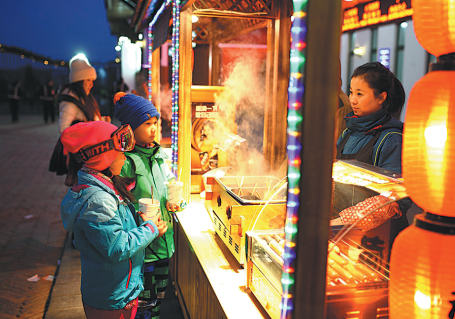 |
|
Children buy snacks at a food stall at a ski resort in Beijing's Miyun district, which has developed skiing, sightseeing, health-preservation, homestay, gourmet-food and shopping experiences for winter vacationers. [Photo provided to China Daily] |
Changchun's government plans to offer 7 million yuan worth of coupons to boost consumption during the festival. The city's major ski facilities, including Tianding and Miaoxiang mountain resorts, offer visitors more than 40 ski tracks, covering more than 1 square kilometer.
Travelers can feast their eyes on the stunning rime, a special type of frost resembling granular tufts of ice, in the province's second-biggest city, Jilin.
The high-speed railway linking Beijing and Zhangjiakou's Chongli district has placed world-class ski experiences less than an hour away from the capital.
The tourism train connecting Beijing, Tianjin and Hebei that began running in mid-November has brought more access to the region's wintertime offerings.
Visitors can enjoy the convenience of Jilin city's recently opened bus service that connects Changchun Longjia International Airport with major scenic spots like Songhua Lake and Beidahu ski resort.
Still, experts are calling for more attention to safety and the sustainability of the domestic ski market.
Zhou Mingqi, founder of the T-identifier Think Tank that focuses on the culture and tourism industries, says that although the domestic ski market is developing rapidly, it's still less mature than developed countries'.
Many domestic travelers ski out of curiosity, rather than a habit or lifestyle.
Consequently, service providers need to offer more pertinent and quality products for skiers of various levels and come up with ways to keep customers engaged, Zhou says.
Zhang, from Genting Resort Secret Garden, says he has faith in China's improving ski market but believes there's still room for relevant infrastructure and service providers to improve.